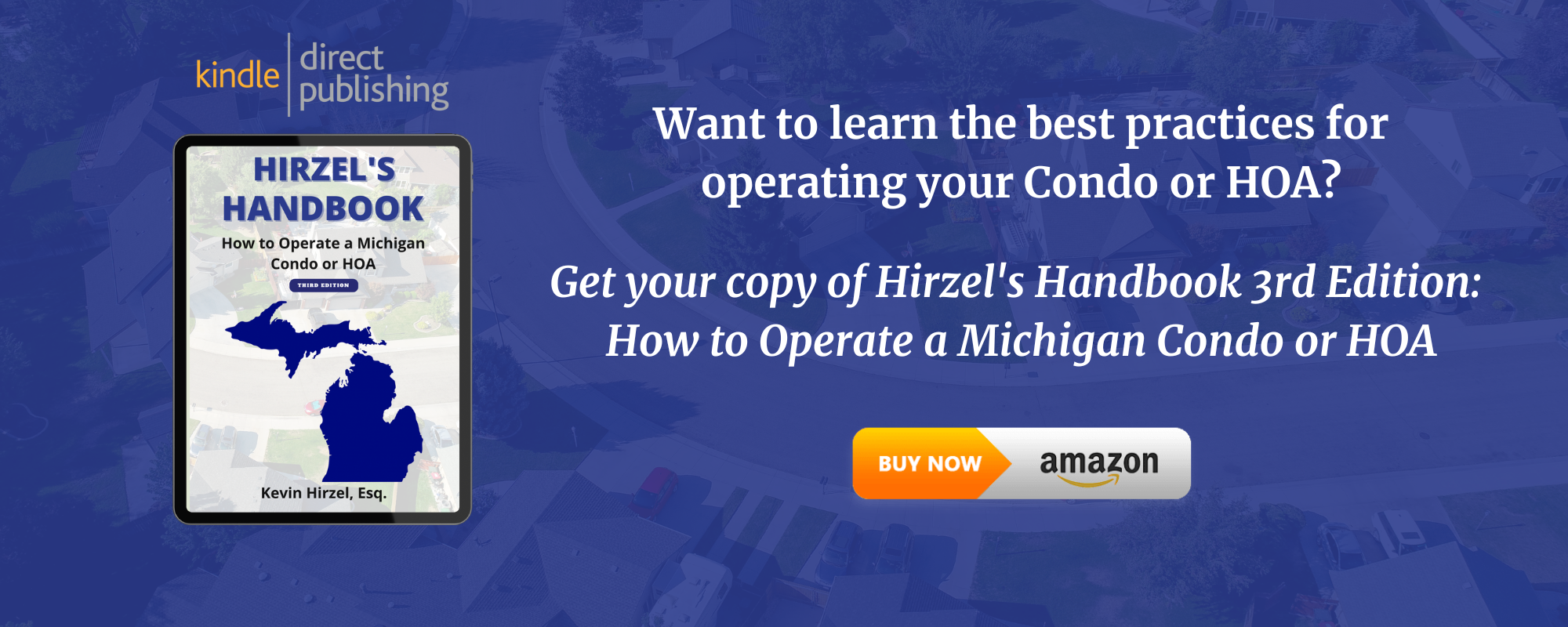About The Author
Kevin Hirzel is the Managing Member of Hirzel Law, which focuses its practice on condominium and homeowners association law. Hirzel Law has offices in Farmington, Grand Rapids, Sterling Heights, and Traverse City Michigan, as well as Chicago, Downers Grove, and Skokie, Illinois. Mr. Hirzel is a fellow in the College of Community Association Lawyers (“CCAL”), a prestigious designation given to less than 175 attorneys in the country. He has served as a member of the Community Associations Institute’s (“CAI”) National Board of Trustees, the national CCAL Board of Governors, and the national CAI Government and Public Affairs Committee. On the state level, Mr. Hirzel served as the Co-Chair of the Michigan CAI Legislative Action Committee, where he assisted in drafting legislation and providing testimony to the Michigan legislature on various bills that impacted community associations. He is the Co-Chairman of the State Bar of Michigan’s Real Property Law Section Committee for Condominiums, PUDs & Cooperatives. Mr. Hirzel has been recognized by Best Lawyers, Leading Lawyers, Super Lawyers and was also named a “Go-To-Lawyer” in condominium and real estate law by Michigan Lawyer’s Weekly.
Mr. Hirzel has been interviewed on community association legal issues by various media outlets throughout the country, such as CBS, CNBC, Common Ground Magazine, Community Association Management Insider, Crain’s Detroit Business, the Dan Abrams Show on SiriusXM Radio, the Detroit News, Dr. Drew Midday Live on KABC Radio, Fox Business News, Fox News, HOALeader.com, the Law & Crime Network, Michigan Lawyer’s Weekly, Newsmax, NPR, the Wall Street Journal, WWJ, and WXYZ. Mr. Hirzel is a dynamic speaker and frequently lectures on community association law throughout Michigan, as well as nationally at the CAI National Law Seminar, and is a two-time winner of the best manuscript award at the CAI National Law Seminar.
About Hirzel’s Handbook
Overview
List of chapters in this Book
Introduction
Chapter One - Types of Community Associations
Chapter Two - Community Association Operations
Chapter Three - Community Association Insurance
Chapter three will help the reader understand the duties of insurance carriers, requirements for associations, and various types of insurance.
Chapter Four - Transitioning the Association From Developer Control to Owner Control
Chapter four will help the reader understand how to transition the association from developer control to owner control.
Chapter Five - Enforcing the Governing Documents
Chapter five discusses the methods that a condominium association can use to enforce the governing documents.
Chapter Six - Collections
Chapter six covers community association collections and expands on how your condominium association can handle foreclosures, when a bank or other mortgage lender is obligated to pay assessments after a foreclosure, and what happens when an owner declares bankruptcy.
Chapter Seven - Amending the Governing Documents
Chapter seven discusses amending the governing documents, providing information regarding when your articles of incorporation need to be updated, when you should amend your master deed, condominium bylaws, or declaration, red flags that your governing documents may be outdated, the process for amending a master deed, condominium bylaws, or declaration, the types of amendments that do not require a co-owner vote, and how to properly use rule-making authority.
Chapter Eight - Fair Housing
Chapter eight focuses on fair housing, such as the process for fair housing claims, theories of liability under the Fair Housing Act, disability discrimination, familial discrimination, race, color, or national origin discrimination, religious discrimination, and sex discrimination.



